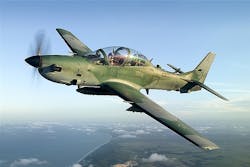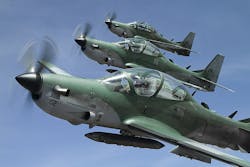Senegal's Air Force orders A-29 Super Tucano turboprops from Embraer Defense & Security
RIO DE JANEIRO, 15 April 2013. The Senegalese Air Force signed a contract to acquire three A-29 Super Tucano light attack, advanced training turboprops from Embraer Defense & Security.
The order includes logistical support for the operation and the installation of a training system for pilots and mechanics (TOSS) in Senegal, bringing autonomy to that country's Air Force in preparing qualified personnel.
The aircraft will be deployed on border surveillance and internal security missions.
"With this contract, we are adding one more customer from the African continent, where the Super Tucano has stirred great interest," says Luiz Carlos Aguiar, president of Embraer Defense & Security. "This is a versatile and robust aircraft, with proven combat experience and it will fulfill, with excellence, the missions for which it was chosen."
Thirteen customers, worldwide, have chosen the A-29 Super Tucano. The model is operating with nine air forces in Latin America, Africa, and Asia, and has surpassed 180,000 flight hours and 28,000 hours of combat.
The Super Tucano, with more than 210 orders and more than 170 units in operation, is capable of carrying out a broad range of missions, including light attack, surveillance, aerial interception, and counter-insurgency.
The aircraft operates with more than 130 weapons configurations and is equipped with advanced electronic, electro-optical, infrared, and laser systems, as well as secure radio systems with data link technology and weapons capacity.
The Super Tucano, the outcome of a project developed in accordance with the rigorous demands of the Brazilian Air Force (FAB), is compatible with combat operations in complex scenarios, where data exchange and information processing capabilities are required. Besides its reinforced airframe for operating on unpaved airfields, the airplane has advanced navigation and weapons guidance systems, which ensures high precision and reliability when using both conventional and smart weaponry under extreme conditions. The airplane requires minimum logistical support for continuous operations.

Courtney E. Howard | Chief Editor, Intelligent Aerospace
Courtney enjoys writing about all things high-tech in PennWell’s burgeoning Aerospace and Defense Group, which encompasses Intelligent Aerospace and Military & Aerospace Electronics. She’s also a self-proclaimed social-media maven, mil-aero nerd, and avid avionics and space geek. Connect with Courtney at [email protected], @coho on Twitter, on LinkedIn, and on Google+.


